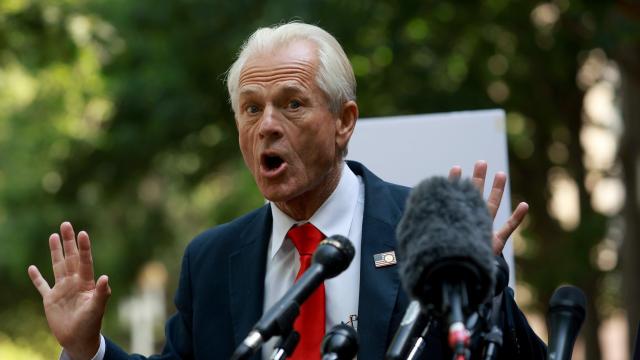The National Archives and U.S. Department of Justice filed a lawsuit on Wednesday against Peter Navarro, one of former president Donald Trump’s advisors, over emails he failed to hand over from his private email account, according to new reports from the Wall Street Journal and the Washington Post. Curiously, the lawsuit alleges Navarro only agreed to hand over the emails if he was granted legal immunity, something he was not given.
Navarro allegedly used a ProtonMail account to conduct official government business from 2017 until 2021 and has refused to give the National Archives between 200 and 250 emails from his time working for Trump — something he’s required to do under the Presidential Records Act. As the lawsuit points out, the PRA, “continues to apply when non-official electronic accounts are used to perform official duties.”
Navarro, whose official titles included Deputy Assistant to the President and Director of the National Trade Council, has repeatedly claimed that Trump actually won the 2020 presidential election (he didn’t) and is facing contempt charges for refusing to cooperate with the January 6th Committee that’s investigating Trump’s coup attempt. Another neo-fascist advisor to Trump, Steve Bannon, was found guilty on a similar charge last month.
Navarro also had a prominent role in the White House advising on the coronavirus pandemic, despite being an anti-vaxxer who spewed misinformation about covid-19 and refused to get vaccinated against the disease.
The lawsuit doesn’t specifically take issue with Navarro’s use of a private email account, even if it was less secure than government encryption, just that Navarro didn’t forward the messages to his government account as he’s required to do by law.
From the lawsuit:
Among other responsibilities, a Covered Individual must copy any Presidential record sent on a “non-official electronic message account” to his official government email account within 20 days, and to otherwise transfer Presidential records received on a non-official account to the National Archives and Records Administration (NARA) at the end of each presidential administration.
Obviously Navarro didn’t do any of that. The lawsuit also says Navarro used “at least one,” private email account, leaving open the possibility there were others. Ironically, one of the central themes to President Trump’s 2016 campaign was that his Democratic rival Hillary Clinton should be thrown in prison for using a private email server during her time as Secretary of State under President Barack Obama.
The lawsuit notes that when the National Archives tried to get in touch with Navarro he didn’t even respond to their questions. When the Archives finally reached Navarro’s lawyers he apparently asked for immunity.
From the filing on Wednesday (emphasis ours):
Prior to filing this suit, in an effort to avoid litigation, Department of Justice counsel contacted Mr. Navarro by email and United States mail to secure the Presidential records that Mr. Navarro had not copied to his government email account. Discussions with Mr. Navarro’s counsel to secure the return of Presidential records ultimately proved unsuccessful. Mr. Navarro has refused to return any Presidential records that he retained absent a grant of immunity for the act of returning such documents.
What exactly does Navarro want immunity for? That part isn’t included in the lawsuit.
Presidential records aren’t subject to the Freedom of Information Act (FOIA) until five years after the president leaves office, and presidents have the power to restrict pretty much anything from public view for 12 years after they leave office. But the courts, Congress, and the president himself can request “special access” to any records during that time if it’s deemed necessary. Presumably, much of the work done by the January 6th Committee is currently falling under that “special access” exemption, assuming they’re getting anything from the National Archives yet at all.
Another thing the lawsuit notes that could become interesting if the public ever sees Navarro’s emails is that the Presidential Records Act doesn’t distinguish between emails sent and emails received, meaning that Navarro is obligated by federal law to hand over emails he received on that private email account which may be related to official government business.
The PRA does not separately address the handling of Presidential records received — as opposed to sent — on a non-official electronic account. Id. § 2209. But Presidential records received on a non-official account do not lose their status as Presidential records merely because they exist on a non-official electronic account. See id. § 2201 (defining Presidential records as including records “received by the President, the President’s immediate staff, or a unit or individual of the Executive Office of the President . . . (emphasis added))). And like all other Presidential records, they are the property of the United States, id. § 2202, and are required to be turned over to the Archivist upon the end of the administration, id. § 2203.
Why would the National Archives make sure to point this out? Perhaps they know Navarro received some emails that could be historically interesting — emails that he didn’t necessarily respond to, but could potentially implicate him in some shady business. That’s just speculation, of course, but it’s hard to guess what other reason the Archives would have for spelling that out at length in the lawsuit.
